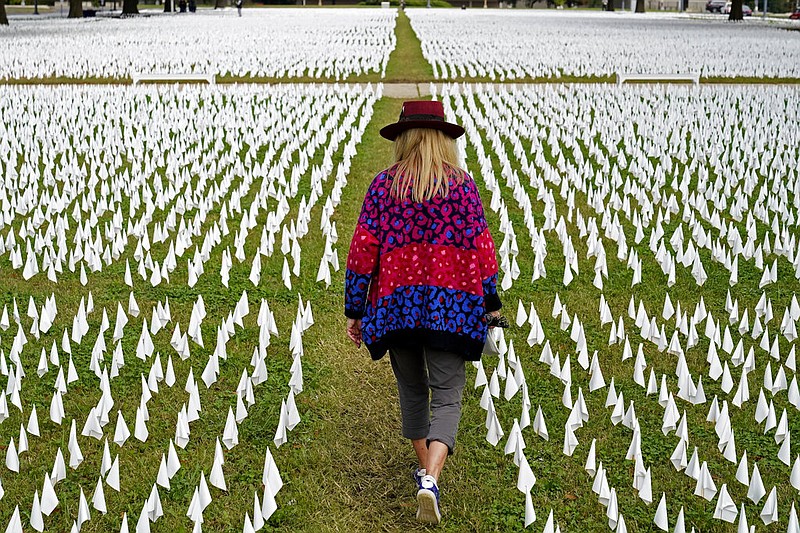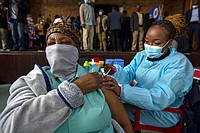The United States on Friday surpassed 700,000 deaths from the coronavirus, a milestone that few experts had anticipated months ago when vaccines became widely available to the American public.
An overwhelming majority of Americans who have died in recent months, a period in which the country has offered broad access to shots, were unvaccinated. The United States has had one of the highest recent death rates of any country with an ample supply of vaccines.
The new surge of deaths this summer means the pandemic has become the deadliest in American history, overtaking the toll from the influenza pandemic of 1918-19, which killed about 675,000 people.
"This delta wave just rips through the unvaccinated," said Howard Markel, a medical historian at the University of Michigan. The deaths that have followed the wide availability of vaccines, he added, are "absolutely needless."
The recent virus deaths are distinct from those in previous chapters of the pandemic, an analysis by The New York Times shows. People who died in the past 3½ months were concentrated in the South, a region that has lagged in vaccinations; many of the deaths were reported in Florida, Mississippi, Louisiana and Arkansas. And those who died were younger: In August, every age group under 55 had its highest death toll of the pandemic.
[Video not showing up above? Click here to watch » arkansasonline.com/102toll700k/]
Close to 100,000 people across the United States have died of covid-19 since mid-June, months after vaccines were available to American adults.
The U.S. government has not closely tracked the vaccination status of everyone who has been infected, but the Centers for Disease Control and Prevention has so far identified 2,900 people who were vaccinated among the 100,000 who died since mid-June.
Vaccines have proved highly effective in preventing severe illness and death, and a CDC study that was published in September found that after delta became the dominant variant, unvaccinated people were more than 10 times more likely to die of the virus than the vaccinated were. The study, which spanned April to mid-July, used data from 10 states, New York City, Los Angeles County and King County, Wash., which includes Seattle.
The pace of death has quickened, then slowed, then quickened again over the past 18 months as the virus has rippled across America in waves.
The most recent 100,000 deaths occurred over more than three months, a considerably slower pace than when the pandemic reached its peak last winter. During that earlier surge, just 34 days elapsed between the nation's 400,000th and 500,000th death.
By late September, more than 2,000 people on average were dying from the virus each day, a level the country had not reached since February.
[Video not showing up above? Click here to watch » arkansasonline.com/102merck/]
About 40% of the most recent 100,000 people to die were younger than 65, a portion higher than at any other point in the pandemic, and Bright has spent months bearing witness to what he calls "premature grief." In one family, a father of teenagers died. A 16-year-old girl in another family lost her mother, aunt and cousin to the virus, all in quick succession.
The delta surge has hit working-age Americans particularly hard. Older people are still more susceptible to the virus but have benefited from their willingness to be vaccinated: People 65 and older, who have been among the most vulnerable to serious illness from the virus, have the highest rate of vaccination of all age groups, at 83% fully vaccinated, according to the CDC.
WINTER FEARS
While a decline in covid-19 cases across the United States over the past several weeks has given overwhelmed hospitals some relief, administrators are bracing for yet another possible surge as cold weather drives people indoors.
Unknowns include how flu season may strain already depleted hospital staffs and whether those who have refused to get vaccinated will change their minds.
Nationwide, the number of people now in the hospital with covid-19 has fallen to somewhere around 75,000 from above 93,000 in early September. New cases are on the downswing at about 112,000 per day, a drop of about one-third over the past 2½ weeks.
Like many health professionals, Natalie Dean, a professor of biostatistics at Emory University, is taking a cautious view about the winter.
[Gallery not loading above? Click here for more photos » arkansasonline.com/102covid19/]
It is unclear if the coronavirus will take on the seasonal pattern of the flu, with predictable peaks in the winter as people gather indoors for the holidays. Simply because of the nation's size and diversity, there will be places that have outbreaks and surges, she said.
The uncertainties of human behavior further complicate the picture. People react to risk by taking precautions, which slows viral transmission. Then, feeling safer, people mingle more freely, sparking a new wave of contagion.
"Infectious-disease models are different from weather models," Dean said. "A hurricane doesn't change its course because of what the model said."
One influential model, from the University of Washington, projects new cases will bump up again this fall, but vaccine protection and infection-induced immunity will prevent the virus from taking as many lives as it did last winter.
Still, the model predicts about 90,000 more Americans will die by Jan. 1 for an overall death toll of 788,000 by that date. The model calculates that about half of those deaths could be averted if almost everyone wore masks in public.
"Mask wearing is already heading in the wrong direction," said Ali Mokdad, a professor of health metrics sciences at the university. "We need to make sure we are ready for winter, because our hospitals are exhausted."
MERCK PILL
Meanwhile, drugmaker Merck said Friday that its experimental pill for people sick with covid-19 reduced hospitalizations and deaths by half.
[CORONAVIRUS: Click here for our complete coverage » arkansasonline.com/coronavirus]
If cleared by regulators, it would be the first pill shown to treat covid-19, adding an easy-to-use weapon to an arsenal that already includes several vaccines.
The company said it will soon ask health officials in the U.S. and around the world to authorize the pill's use. A decision from the U.S. Food and Drug Administration could be made within weeks after that, and the drug could be distributed quickly soon afterward.
All other covid-19 treatments now authorized in the U.S. require an IV or injection. A pill taken at home, by contrast, would ease pressure on hospitals and also could help curb outbreaks in poorer and more remote corners of the world that don't have access to the more expensive infusion therapies.
"This would allow us to treat many more people much more quickly and, we trust, much less expensively," said Dr. William Schaffner, an infectious-disease expert at Vanderbilt University who was not involved in the research.
Merck and its partner, Ridgeback Biotherapeutics, said early results showed patients who received the drug, molnupiravir, within five days of symptoms had about half the rate of hospitalization and death as those who received a dummy pill.
The study tracked 775 adults with mild-to-moderate covid-19 who were considered high-risk for severe disease because of health problems such as obesity, diabetes or heart disease. The results have not been reviewed by outside experts, the usual procedure for vetting medical research.
Among patients taking molnupiravir, 7.3% were either hospitalized or had died at the end of 30 days, compared with 14.1% of those getting the dummy pill. After that period, there were no deaths among those who received the drug, compared with eight in the placebo group, according to Merck.
The results were so strong that an independent group of medical experts monitoring the trial recommended stopping it early.
Company executives said they plan to submit the data to the FDA in the coming days.
White House coronavirus coordinator Jeff Zients said vaccination will remain the government's main strategy. "We want to prevent infections, not just wait to treat them when they happen," he said.
Anthony Fauci, the government's foremost authority on infectious diseases, called the results from Merck "very good news."
Merck studied its drug only in people who were not vaccinated. But FDA regulators may consider authorizing it for broader use in vaccinated patients who get breakthrough covid-19 symptoms.
Pfizer also is developing an oral antiviral drug, and announced this week that it was initiating a later-stage clinical trial testing the drug's ability to prevent illness in people exposed to the coronavirus. Atea Pharmaceuticals also is working on an oral antiviral with pharmaceutical giant Roche.
NO-SHOT SURCHARGE
Separately, Louisiana's largest health system is ratcheting up the pressure to get vaccinated.
Ochsner Health told employees that it will charge them a monthly premium of $200 if a spouse or domestic partner covered under an Ochsner health plan is not vaccinated, The Times-Picayune/New Orleans Advocate reported.
Ochsner has said all employees must be vaccinated by Oct. 29 to keep their jobs.
President and CEO Warner Thomas said the surcharge for unvaccinated spouses and partners is part of an effort to keep health premiums low. As a self-insured organization, Ochsner bears the cost of covid treatment for patients who are on its insurance plan. Unvaccinated people account for the vast majority of the health system's covid patients.
"The reality is the cost of treating covid-19, particularly for patients requiring intensive inpatient care, is expensive, and we spent more than $9 million on covid care for those who are covered on our health plans over the last year," Thomas said in a statement.
The covid vaccination fee for spouses will begin in 2022 and could deduct up to $2,400 yearly from the employee's paycheck. The fee is only for domestic partners or spouses, not other dependents such as children, according to a letter Ochsner leaders sent to employees.
Thomas said the surcharge isn't a mandate because spouses and partners can choose other insurance coverage, and because they also can apply for a medical or religious exemption.
Meanwhile, Louisiana is trying to encourage more people to get the covid-19 shot by offering them a cash incentive.
Gov. John Bel Edwards announced Friday that Louisiana's "Shot for 100" program, which has been offering $100 cash cards to college students who get vaccinated, is expanding to offer the money to anyone who gets newly immunized.
Information for this article was contributed by Julie Bosman and Lauren Leatherby of The New York Times; by Carolyn Y. Johnson of The Washington Post; and by Amy Forliti, Carla K. Johnson, Zeke Miller, Matthew Perrone and staff members of The Associated Press.

